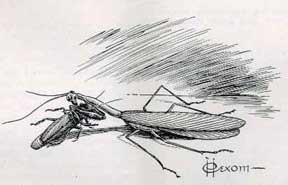By ARCHIBALD HOWARD
Page 1 [1] | Page 2 [2] | Page 3
The male was obviously much perturbed, eager now to leave the mate he had traveled so far to join. His forelegs were at the moment useless to him, hut with his other legs he tried to hold securely to the branch and to the leaves. Yet every time that he appeared to have gained an advantage Sinensis would shift, slightly but enough to place him again in jeopardy.
I became convinced that it was only a matter of time until the male would come within reach of those powerful legs that I had seen unfold so many times to seize instantaneously their helpless victims. Sinensis was a third larger than her mate, and I knew that the outcome of a struggle would be certain victory for her. The male's chance was to leap away, and I had watched him into the early hours of the morning vainly trying to get into position for this.
Then the lamp bulb burned out, and I was suddenly too tired to replace it.

The fascination had been interrupted, and I was too much in need of eye rest to watch Ionger. And furthermore I was convinced of the outcome. So I went to bed. It was half past three in the morning.
Since nine o'clock of the previous evening I had been watching these insects, and I was suddenly aware that within six hours I was expected to be in an office.
The next morning at seven-thirty the male was once more on the window sill.
Only a few days later he died. As a result of his mating he had lost one of his smaller legs, and if insects bleed he may have in this way been fatally weakened. He refused to eat. He had served his purpose in life, and apparently that was all of life there was left for him when he made his way to my apartment. Sinensis would probably have devoured him if she could have. Perhaps it would have been better had she succeeded. What was otherwise useless to Nature might then have helped nourish another generation.
Reasoning in this way, I concluded that the logic of Nature corroborated my author, although in the instance that I observed, the male escaped.
A few days later Sinensis laid her eggs, embedding them in a cone-shaped mass with its base attached to the under side of one of the twigs on her branch. The cone was formed of a thick, paste-like substance that she exuded from her abdomen, as she moved about in a spiral that ended with the tip of the cone. This substance apparently contained the eggs. The cone hardened, taking on a brownish hue like that of the insect.
I might have kept these eggs longer, continuing my observations throughout the insect's life cycle. But I learned of a university entomologist who was studying the mantis, and to him I took them.
Sinensis was a companion of a sort for me during the few weeks that followed. I furtively encouraged the propagation of cockroaches in my desk at the office, carried them home in a small box and fed them to the mantis. Probably the warmth of the apartment and this special provision of food lengthened her life, but she was unable to resist old age. She died in November – a cockroach in her grasp.
